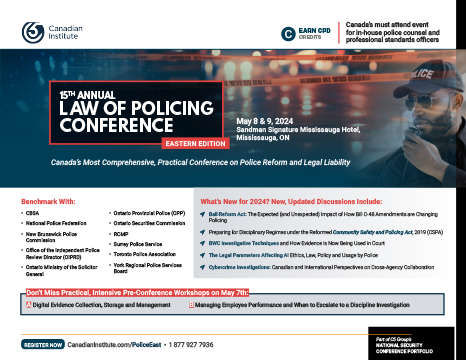Agenda

Download Brochure
Flip through our 2024 conference brochure and discover what’s new this year.
- Jump to:
- At a Glance
- Day 1
- Day 2
- Print-friendly Format
Day 1 - Wednesday, May 8, 2024
Day 2 - Thursday, May 9, 2024
Day 1 - Wednesday, May 8, 2024
| 7:45 |
Registration Opens and Refreshments Served |
| 8:45 |
Opening Remarks from the Co-Chair Sgt. Amar Gosal |
| 9:00 |
Bail Reform Act: The Expected (and Unexpected) Impact of How Bill C-48 Amendments are Changing Policing Jon Reid  Eric Neubauer This session will look at Bill C-48, An Act to amend the Criminal Code (bail reform) which comes into effect January 2024. How will the bill work in concert with the Canadian Charter of Rights and Freedoms and the Criminal Records Act.
|
| 9:45 |
Preparing for Incoming Disciplinary Regimes under the Reformed Community Safety and Policing Act, 2019 (CSPA) Lauren Katz  Larry Vieira The Comprehensive Ontario Police Services Act (2019) which came into effect April 2024, with updated rules for disciplinary hearings. Different types of disciplinary action can be imposed by the Chief of Police without first conducting a hearing.
|
| 10:30 |
Networking Break |
| 10:45 |
FOCUS ON BWC PART IBWC Investigative Techniques and How Evidence is Now Being Used in Court Sunil Mathai  Deqa Nur  Margaret Sciortino In a precedent-setting 2023 Ontario Court decision, the act of two Toronto Police Service officers muting their body worn cameras during an arrest, has resulted in an acquittal following a 2021 impaired driving charge. In a second unrelated case, gun charges were dropped after Durham Regional Police officers testified they also muted their microphones mid-arrest. This session will discuss the evolving legal implications of BWC evidence in court. |
| 11:30 |
The Legal Parameters Affecting AI Ethics, Law, Policy and Usage by Police Dubi Kanengisser  Katherine Robertson
|
| 12:15 |
Networking Luncheon for Speakers and Delegates |
| 1:30 |
Keynote Address |
| 2:00 |
STATUS UPDATEDissecting Trends in Complaints and Charges Against Police and Disciplinary Outcomes – From Use of Force to Frivolous Complaints Justin Amaral  Carla Goncalves  Sgt. Amar Gosal  Jennifer Smith Delegates will hear a status report on the types of complaints being lodged against police officers, the frequency of the types of complaints, and how there are viewed by oversight agencies. Discover which types of complaints are most common, which are considered vexatious and/or frivolous, and which are of most concern. |
| 2:45 |
Networking Refreshment Break |
| 3:30 |
The Evolving Case Law on Using Electronic Surveillance: Grey Areas and How to Navigate Them Anil K. Kapoor  Solomon Friedman This session will look at the evolving legal, operational and budgetary challenges surrounding electronic surveillance.
|
| 4:15 |
CROSS-BORDER INVESTIGATIONSCombating Cyber and Trafficking Crimes Affecting Missing and Murdered Indigenous Women and Girls Taken Across the BorderThis session will delve into the awareness and prevention work the United States Department of Homeland Security is doing to address missing and murdered Indigenous people, both in the realm of cybercrime and human trafficking, across the U.S.-Canada border.
|
| 5:00 |
Closing Remarks from the Co-Chair |
Day 2 - Thursday, May 9, 2024
| 8:30 |
Registration Opens and Refreshments Served |
| 9:00 |
Remarks from the Co-Chair |
| 9:05 |
Carding, Legacy Data and the Liability for Police DepartmentA 2023 class action lawsuit has been brought against Toronto Police Service for the historical and ongoing practice of “carding” and data retained from carding. This session will review Chief Justice of Ontario Michael Tulloch 2018 “Report of the Independent Street Checks Review” as well as take stock of implementation of the 129 recommendations. |
| 9:30 |
FOCUS ON BWC-PART IIBWC Privacy Policy: How Police Services are Updating the Privacy and Body Worn Camera Policy R. Kyle Friesen
|
| 10:15 |
Networking Break |
| 10:30 |
Conducting Complaint and Misconduct Investigations Under Ontario’s Incoming
|
| 11:15 |
Cracking Cold Cases with Emerging DNA Technologies and the Impact on Case Outcomes Jack Laird  Jeremy Tatum
|
| 12:00 |
Networking Luncheon for Speakers and Delegates |
| 1:00 |
Cybercrime Investigations: Canadian and International Perspectives on Cross-Border Collaboration Insp. Lina Dabit
|
| 1:45 |
Prisoner Release: What Information Can and Cannot be Shared between Police, Corrections and the Public Sarah Hunter This session will examine what information is shared between corrections and police when an inmate is released as well as the information sharing process.
|
| 2:30 |
Networking Refreshment Break |
| 2:45 |
The Finer Points of Disciplinary Hearings Amid Long-Term Disability Claims: Special Considerations and Key Pitfalls to Avoid David Butt
|
| 3:30 |
The Roles of Community Advisory Boards and the Coordination with Police Anitra Basant Sisavang Under the incoming Community Safety and Policing Act (2019), police services boards are required to create a diversity plan to ensure that the members of the board reflect the diversity of the surrounding municipal population.
|
| 4:15 |
Closing Remarks from the Co-Chair |